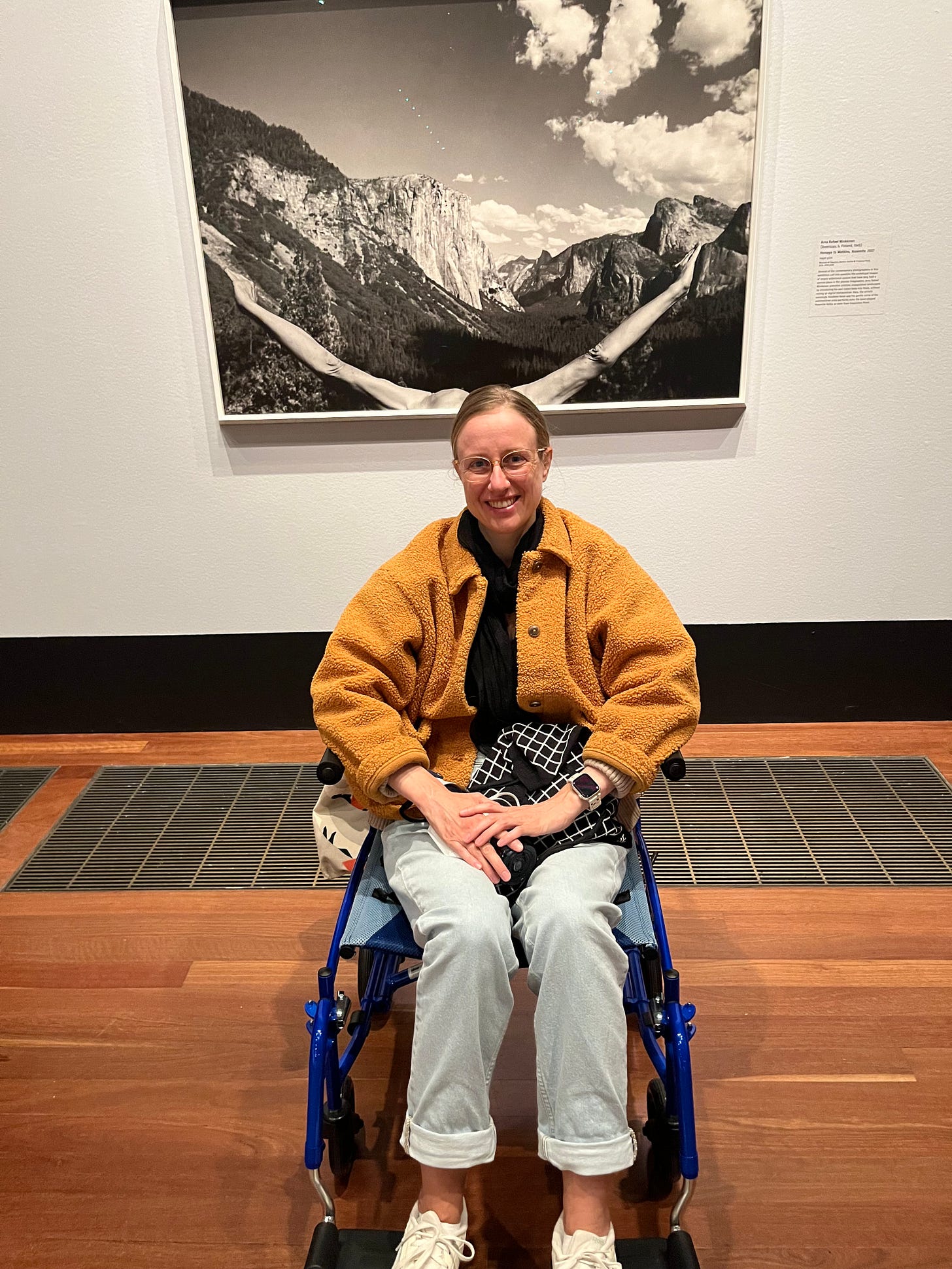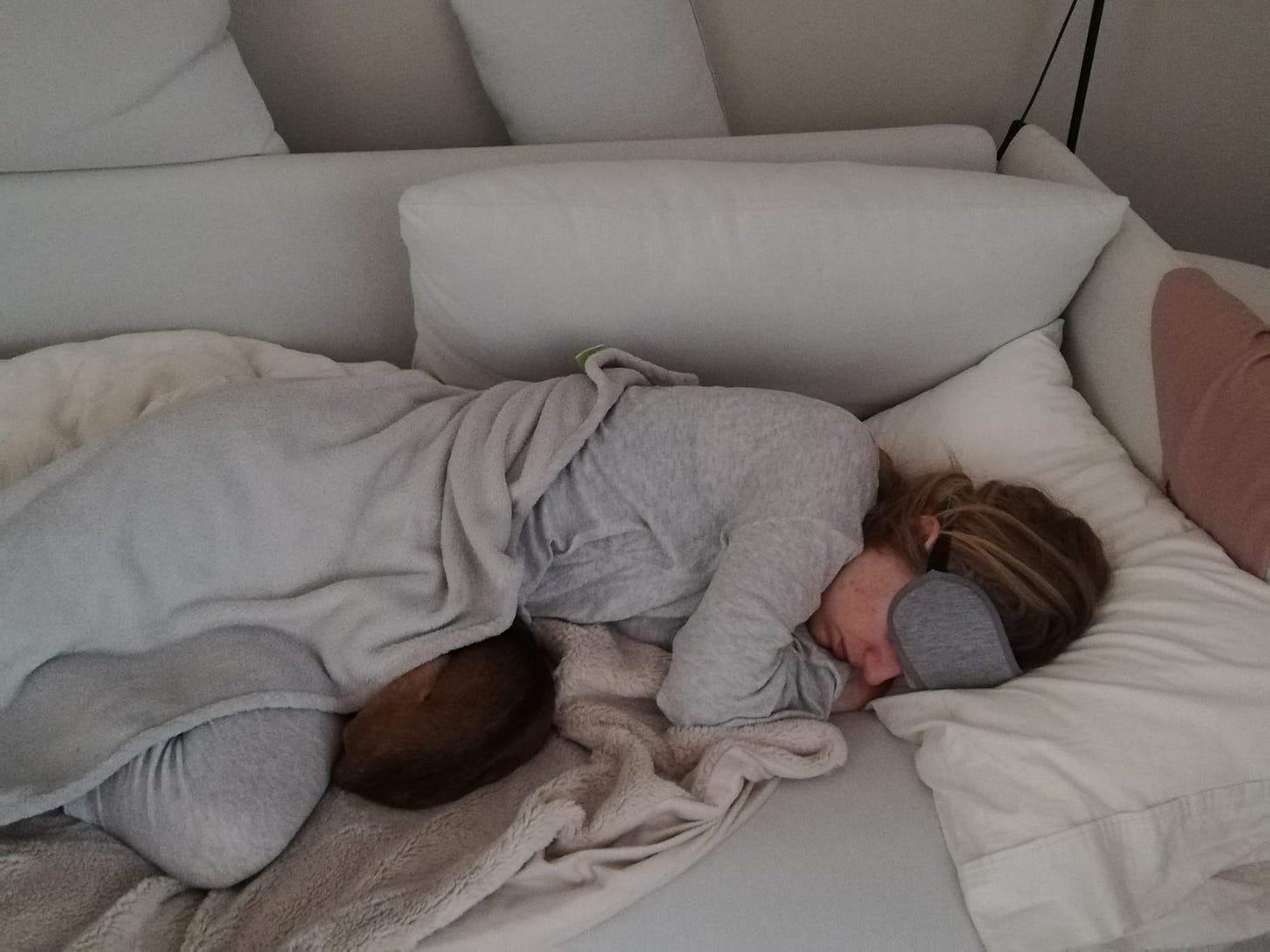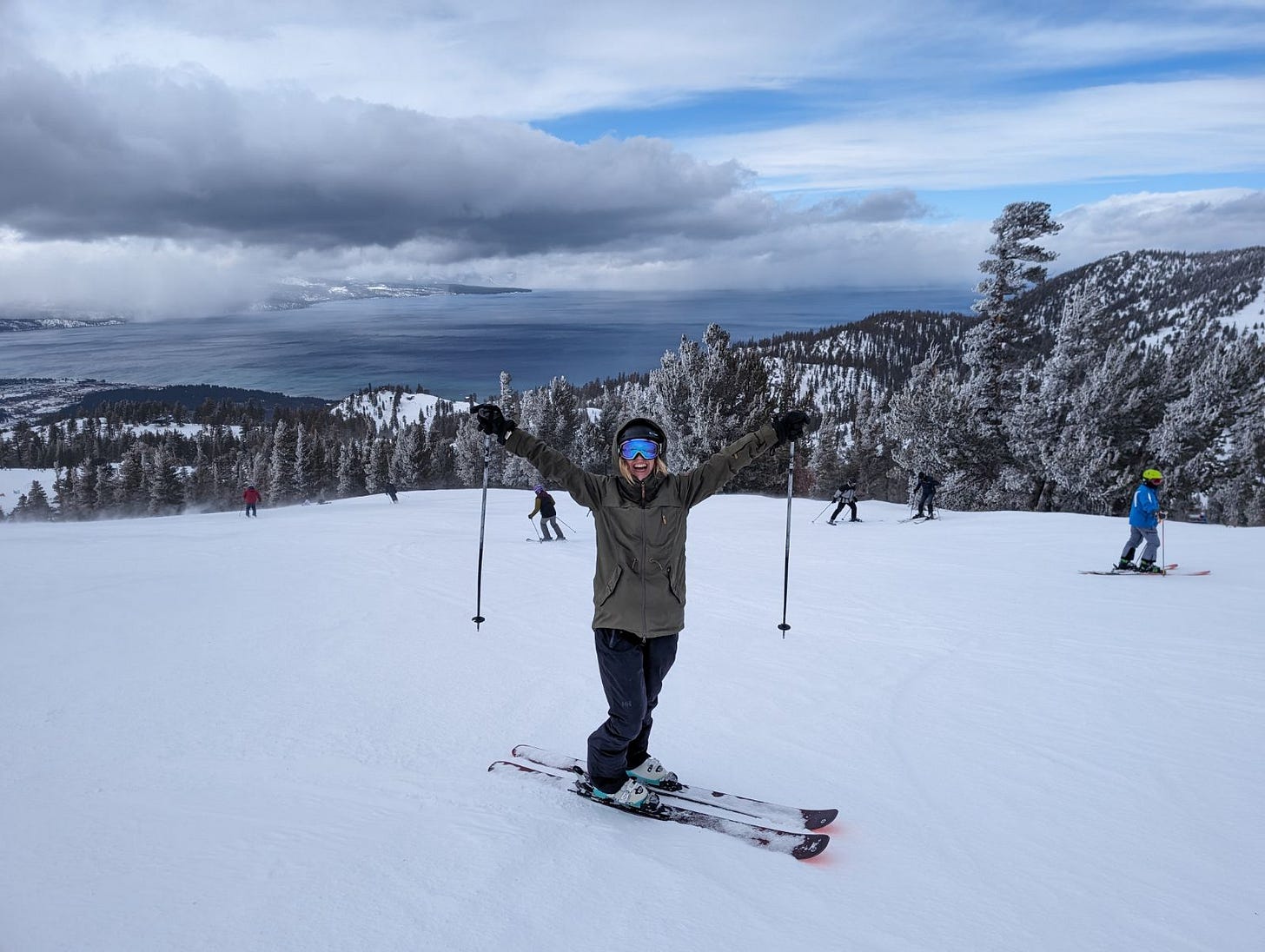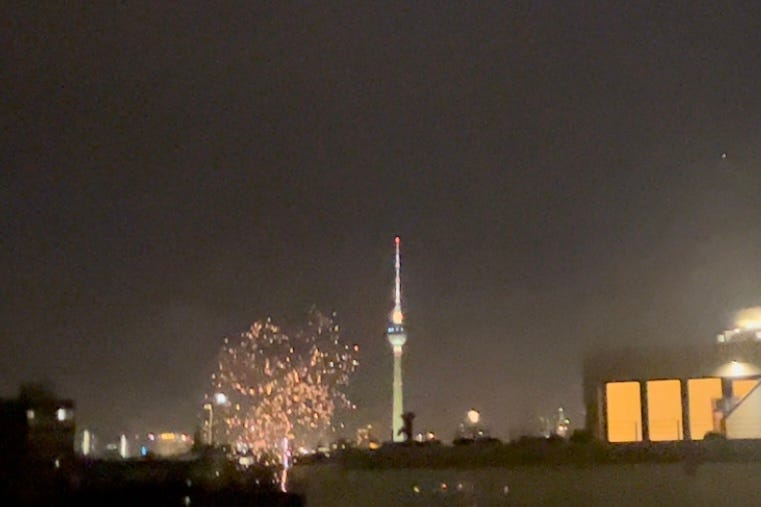What Long COVID was like for me (and why I'm writing this)
Having severe Long COVID was brutal. I didn’t find much medical help, but through trial and error I found my way back to life. I’m sharing my learnings, in the hope that they'll help others, too
The onset
In early 2023, a COVID-19 infection suddenly pulled me out of my fast paced life. I had just come back home to San Francisco after a few weeks abroad, working remotely, and was looking forward to spending time at a ski cabin I had organized for a group of friends. When I came down with COVID, I first didn’t think it was a big deal. I’d always had a good immune system.
Over the first weeks after getting sick, it became clear that this was different from anything I’d experienced before. I was hardly able to get up off the couch, not able to breathe well, unable to maintain focus. A short walk to the end of the block would require complete rest for the rest of the day. Friends brought food and groceries, took care of my laundry, for weeks. I was confused. What was happening? My doctor wasn’t much help in answering. She seemed as surprised as I was, and mostly unconcerned.
After more than a month, I was finally doing a little better. I was still not able to walk more than a few blocks without needing to take breaks and then collapsing later from exhaustion, but I was better than before. I figured I could start working again – after all, I could work remotely, on a computer, which didn’t require any physical exertion or walking. And surely some normalcy and routine would help, while I waited for my body to recover? I had been bored out of my mind, locked in my apartment, unable to do much at all – I missed my friends, missed my hobbies, missed my work. I missed my busy life. I was also worried that if I was out any longer, I’d have to go on disability – certainly not something I wanted. So, I was eager to get back to work. Today I wonder–if I had stayed in bed properly and stayed off work for awhile longer, would I have recovered then? Could I have avoided what came next? But at the time, I was excited to finally go back to work and start resuming my life. My doctor was encouraging it, too.
It didn’t go well. During the next two weeks, working reduced hours, I became so physically exhausted that I had to constantly lie down, unable to manage even a light workload. A coworker pulled me aside after a meeting to tell me I had been repeating myself. I wasn’t aware, and couldn’t remember. (Much later I learned that the neurological symptoms of Long COVID can resemble stroke or dementia). One day I found myself unable to log on to my next meeting, one I’d been looking forward to. I was so physically exhausted that there was no other option left than to lie down and call in sick again. I knew at that point that I’d have to go on disability. And knowing how slow my recovery had been going for the last two months, I felt in my gut that I wasn’t going to be back for a while. I was sad that I wasn’t going to be able to say goodbye to my team, that I’d miss out on a project I was really excited about. But most of all– my hopes of finally pulling through and getting back to my life were completely crushed. I was baffled by the reality that I would need to continue to be holed up at home, by myself, bored, for even longer. It had already been two months. This is when my future started to feel very uncertain, and entirely out of my control. I was sad, frustrated, and scared, and I felt an intense feeling of loss. It was like seeing my life float away, down a river that was faster than I could run, with no way of reaching it.
On the medical side, my doctor still seemed out of her depth, still seeming to think I’d be back to work again in weeks. I pushed for diagnostics, jumped through all the required hoops of medical protocol, and finally got a CT scan. The CT showed signs of pneumonia and myocarditis. My doctor finally seemed to understand what I had been trying to tell her all along – that I was seriously sick. She prescribed more, stronger medications this time. I was hopeful that this would finally fix it. Fix me.
Instead, my condition started declining more rapidly. Even putting food in the microwave or getting dressed were now more than my body could manage. My friend started coming into my apartment several times a day, to make sure I had food and water near me. He had to let himself in with a key – I couldn’t get up to open the door anymore. My doctor made referrals to various specialists at my urging, and was now out of ideas. The two Long COVID clinics in the Bay Area both declined seeing me, despite several referrals. I was slipping through the cracks of their stringent criteria, not having taken a PCR test or been hospitalized during the initial acute infection. They wouldn’t budge, unfazed by the severity of my condition. The other specialist appointments (regular cardiology, pulmonology, neurology) were months out, despite my doctor’s insistence that it was urgent. Months more in this state, barely able to move, before even seeing a doctor who might be able to diagnose me? I was increasingly desperate. At this point my mother came over from Germany to provide me round the clock care.
The darkest period
During the worst months, I spent 23 hours a day lying down, barely able to walk the few steps from my bed to the bathroom, some of the time in a daze. In addition to the debilitating fatigue, I had cognitive issues, memory loss, nausea, dizziness, body pains, racing pulse, palpitations, tremors, numbness, digestion issues, sensitivity to sound, light and touch, and a range of other symptoms I had never experienced, impacting every major system in my body. Nothing was working. My limbs felt like I was wearing a lead suit, like moving through cement. Like there was cement in my brain, too. I had a hard time thinking or focusing on anything. In the mornings, I often had a sensation I can only describe as my body being poisoned or suffocating. Like my cells were not getting oxygen (I now know that they did get oxygen, but that the next step, cell energy production, can be severely impacted in Long COVID - so oxygen wasn’t being converted to energy that the cells need to function. My sensation of suffocating wasn’t far off). It felt awful, and not remotely like anything I had ever experienced before. The symptoms increased whenever I’d be upright (known as “orthostatic intolerance”). My pulse would be at 130 just sitting, or doing as little as lifting my hand to brush my teeth–up from 50s resting. I’d feel awful. I had a shower seat for seniors so I could sit down in the shower, but eventually even that became too exhausting. One by one, I lost the capacity to every little day to day thing. Some days, I could barely sit up in bed for long enough to eat. Any time I exerted myself too much, which was minuscule levels, my condition would worsen significantly, for days or longer. This would happen seemingly randomly, not immediately, but a day or two removed, so it was hard to know what exactly was too much. Was it sitting up for too long this morning? Brushing my teeth? Making a necessary phone call to the insurance company yesterday? Taking a bath a few days ago? Was it the new medication yesterday? It was extremely confusing. If my phone or a glass of water was in the other room, I couldn’t just get up and get it - if I pushed through the fatigue, I had learnt by experience over and over, it would trigger a new shift downwards. I mostly needed to be in a quiet room. At times my nervous system couldn’t even tolerate my mom touching my hand. I felt disconnected from the world, trapped by my own body.
In my search for answers, I had quickly come across the low recovery rates for Post Acute COVID Syndrome, even after years. I had learned that experts didn’t yet have effective treatments. That research results might be years out. Learned of the close resemblance to ME/CFS (myalgic encephalomyelitis/chronic fatigue syndrome), a severe and chronic neuroimmunological condition, for which there was no known cure. I can’t begin to describe how that all felt emotionally. My sense of loss was all encompassing – I had lost not just my health, but my entire life. My independence, my hobbies, my social world, my ability to see family and friends, my career. It was unimaginable, and yet it was the new reality I was living in. Meanwhile, most friends didn’t seem to grasp the severity of what I was going through. I had stopped hearing from most of them after mentioning that I was still sick after the first weeks – only a few seemed to want to hear about it. Some seemed confused or maybe even a bit offended that I couldn’t meet up, others seemed unsure what to say and deeply uncomfortable. Some even made jokes about my situation– surely well intended, but extremely hard to hear. Some of my requests for help went unanswered, or took months to get a response. What was happening to me–that I had lost my life as I knew it, that I was months into an extremely unclear future–seemed to get lost in the busy-ness of everyone’s lives. I had always been an extremely independent person – I lived in 5 different countries in my 20s, I learned several languages, I made a career in Silicon Valley for myself after moving to the US at age 30. I loved to dance until sunrise. Now, in my late 30s, I needed my mother’s help bathing, and was continuing to decline. I was only able to leave the house for doctor’s appointments, and then needed to be brought in a wheelchair, lying down in the car because I couldn’t sit, with several days of complete rest before and after.
The doctors were shrugging their shoulders. Despite this being 2023 and years into the pandemic, they didn’t seem to have a protocol for post-COVID at all. My symptoms and their severity were apparently unexplainable to them. One doctor even told me it wasn’t a big deal and actually said, “don’t worry about it.” (At that point, I already required round the clock care, had been brought into her practice in a wheelchair, and I had lost my life as I knew it. I’m still enraged when I think of this doctor’s incompetence and tactlessness). The better doctors took me seriously, and were aware that COVID could cause this, even in young and healthy people–but they didn’t have a treatment either. I was diagnosed with Post COVID condition, and later with its most severe form, ME/CFS, as well as POTS, a severe chronic cardiac and nervous system condition (postural orthostatic tachycardia syndrome)–both with no known cure. Diagnoses of cardiomyopathy, myocarditis, and pneumonia came somewhere along the way. The doctors had no next steps.
Whenever I did have a little bit of energy, I’d spend it searching for answers. What was this vicious illness? What was wrong with my body? Who could help me? Was I going to get better?
A turning point
Fast forward a few months to July 4, of all dates (Independence Day in the US, for those of you elsewhere). I managed to take the stairs down to my backyard for the first time in months, all twenty steps. I was using a cane and my mom’s help, but I did it. I love the backyard of my apartment building: it’s lush with palms, big succulents, and a lemon tree. I took a seat in the yard for a little bit, feeling the evening air on my face. The bamboo was rustling in the wind, and it was uncharacteristically warm. Being down in the yard, for me, was huge. I was exhausted, but I couldn’t get the grin off my face.
I know it’s a little cheesy but this really was the first day I was able to take the stairs again, so the July 4th holiday will always be tied to this “personal Independence Day” for me. Watching the neighborhood fireworks outside—I don’t think I’ve ever been happier than at that moment, enjoying that huge accomplishment with my mom. That I could even be outside, that my body tolerated the commotion. Getting my life back was starting to feel possible again. Over the previous month, I had been slowly, carefully, and deliberately expanding my body’s tolerance to movement, starting with just a few seconds a day, then resting for a day or two. I’ll share more on how I went about that in one of the next posts. When I made it to the backyard after a month of “training”, I knew in my gut that this approach was working. That this accomplishment was going to be a turning point. Back to the backyard, back to my life!
Now
It was about a 5 month span of time where I went from bedridden (0% functionality on this scale) to some semblance of normal functioning (about 60-70% functionality). I still needed lots of rest and was well below regular capacity, and still experiencing moderate symptoms. But after 5 months, I was able to travel back to Germany without help, walking myself through two major airports, not needing the wheelchair that was ready for me just in case.

Now, 10 months after my July 4 turning point, I am doing much, much better. I’ve largely had my life back for a few months now. Am I “fully recovered”? Recovery is weird, and not linear. I feel recovered most of the time, and my body feels normal again, but I still have very mild symptoms here and there. I still take it easy, currently living a slower life than my fast paced one pre-illness, to avoid relapsing. That puts me somewhere around 80 to 90% on the scale (as of May 2024). The important thing is, I feel well. I’m living my life, and I’m able to do a lot of physical activities again already. In 2024 so far I’ve gone hiking, camping, and even skiing. I’ve learnt to be closely in tune with my body and to stop before I reach its limits. In certain ways I could say I’m feeling better / healthier / fitter than before I got sick (I’ll share more on that) – as I said, recovery is weird! But the main thing is, I have my life back. Given where I started, and how far I’ve come, I know in my gut that getting to 100% is a question of time, and at this point I’m not in a rush anymore (I’ve learned that rushing doesn’t help) [update 2025: I’m fully recovered]. I continue practicing the tools that got me here, every day.
It’s been a long and extremely difficult journey, and yet I know that I’m lucky. That, given where I was, it was an unusually quick recovery. That’s a big part of why I want to share everything that has helped me.
What you can expect: a repository of tools and learnings
This newsletter is going to be a repository of everything I’ve learned and of the resources that were helpful for my recovery. Early on, I was desperate for advice and would have been relieved to find even one person who had recovered from my level of severity. For a long time, the only person I knew who’d recovered wasn’t fully back to normal, and she had had a relatively mild version compared to me. This is why I want to put my story out there. I went through some really hopeless moments, but eventually I got back to health. More than anything, I wish I had known earlier just how much there was I could do myself to help my body heal.
Finding the information I needed was a very long and lonely road, using every ounce of spare energy I had, and cobbling together every bit I could—from podcasts, blog posts, YouTube, books, alternative health practitioners, research papers, patient organizations, paid programs, and (eventually) a couple of rare knowledgeable doctors. I’ll share all that information, and consolidate it. I’m creating this newsletter in the hopes that it can be a good resource, and that others might have an easier time finding what helps them.
I’m planning to post every week or two for the next few months, and I’ll group all the different learnings into categories so that the information is easier to navigate. I’m also planning to share a lot of detail on how I’ve been using tools like breathwork, anti-inflammatory diet, and supplements, along with links to good resources and research where I have them. I’m also going to explain how I slowly expanded my body’s capacity, as mentioned above (it’s called baseline training), which was key.
Just to be clear, I did not find a “cure.” I did not find one silver bullet that healed all my symptoms. And my process was just trial and error, with many tiny steps. I’m eager to share here the major themes and learnings from my personal road to recovery. I’ll start next week with an overview - my mental “recovery framework” (update: here’s the overview and framework).
How you can support me
I’ll be honest, putting something this personal on the internet is not exactly easy. I was never much of a share-er online, and this entire journey, going through severe illness, disability and many traumatic experiences, has felt intensely vulnerable. Long COVID, ME/CFS and POTS are extremely varied and complex illnesses, so what works for one person doesn’t work for everyone (despite how enthusiastic I might be about it). Moreover, I’m also thinking of people who have been suffering from these conditions for years or even decades without improvement, and have already tried everything in their power. I can only imagine that there’s nothing more frustrating than someone like me, with my considerable privilege, saying “look I did it, it took only a few months, and you can do it too”. I understand how that would feel, and I don’t want to be that person. I’ve gotten lots of BS advice from people with no clue about my condition myself. And yet–if it can help even one person get their life back, I have to share my story. So I am hoping for your generosity in reading this—bearing with me when I’m rambling, and kindly disregarding the pieces that aren’t for you. You can support me by sharing your feedback and questions with me, by subscribing, and by sharing this with anyone else who you think might find it useful. Thank you!
Some hope and more fireworks!
Just six months after watching the July 4 fireworks from my backyard in San Francisco, I was able to see them again, this time from a rooftop in Berlin while celebrating New Year’s Eve with old friends. Watching this set of fireworks was every bit as magical. I was again overwhelmed by gratitude, this time for finally being well enough to travel home back to Germany, and to be with my friends there. I was looking back on how far I’d come and looking forward to a new year. I could not have been more excited.
I’m curious to hear from you. What brought you here? Where are you on your journey? What would you most like to hear about?
All my best,
~ Nicole
Thank you
I’ve been getting lots of help, advice, and support from friends old and new these last months – thank you to everyone who has supported me in this scary/exciting endeavor!
Particular thanks to my friend Melissa, who generously edited this, and gave me much needed advice. We met exactly when we needed to meet (a few months ago, as I just started wrapping my mind around writing this), and exactly where we needed to meet (sitting in a hot spring overlooking the Pacific Ocean, which happens to be my favorite spot on earth). I am grateful. The universe always provides, if we let it.







Hi Nicole - I’m so glad you found me and my newsletter, so that I in turn could find you. I’m four years in and have had spurts of this non-linear recovery each year, but it’s only been in the last year that the work I’m putting into it is progressing and building on itself, albeit slowly. Adding in and testing out movement has been key, as you’ve said. I also very much appreciated your acknowledgment of the “privilege” you have had in experiencing a relatively shorter illness and recovery period than many of us. It meant a lot to me that you put that out there, so thank you. It makes me want to stick around for what’s to come in your newsletter, too.
I’ve been on Substack since last July (soon after your independence day 🎆), and recently I started a recovery tools series. I’m about at 60%, and like you, I don’t have all the answers, but some combination of things has definitely been working so I wanted to share what they are. I’m very curious to cross-reference our lists.
One question: are you back working? Same job you had before? I had to give up my non-profit executive job of many years. In fact, my SSDI administrative hearing is by phone in less than an hour, so I better get up and get ready!
Glad you’re here!
Hi Nicole, thanks so much for sharing. I read this post now after your other posts. I too was at 0% last year, now I'm at 30%. Apart from the usual PEM after exercising, I developed severe light and sound sensitivity and was only able to overcome it (mostly) this year. I had to smile when seeing your fireworks picture with the TV tower. At that time, I was in bed, trying to sleep with headphones on and happy that I had just started medication that allowed me to survive NYE with just a minor crash afterwards. I find it beautiful to think that someone, on another part of the city, was actually enjoying the fireworks after having been in the same situation as me. Truly inspiring. Thanks for sharing all of this!